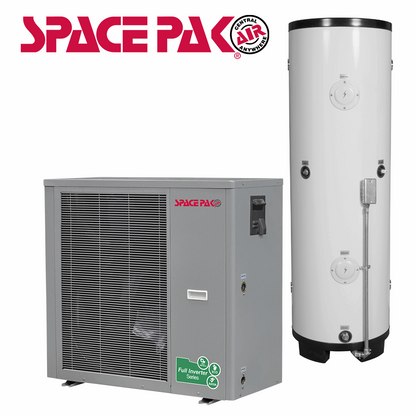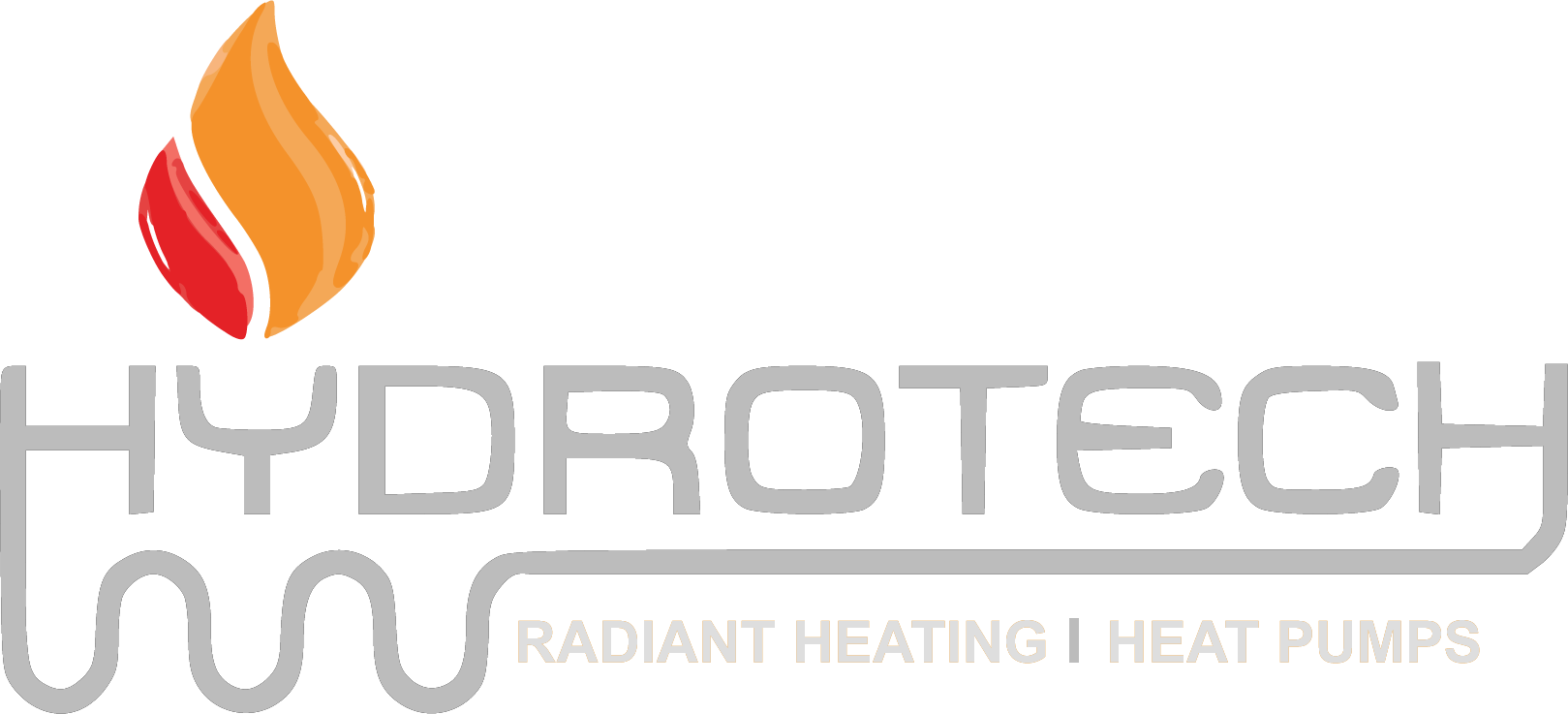Heat Pumps
Begin Your Electrification Process with Hydrotech
We specialize in upgrading homes in San Francisco and the Bay Area from gas-based heating and cooling systems to efficient electric solutions. Start your home’s transformation by clicking below. Collaborate with us to make your home eco-friendly, efficient, and future-proof.
Proudly Offering Spacepak Heat Pumps
SpacePak heat pumps offer a modern, efficient solution for heating and cooling homes, particularly in settings where traditional HVAC systems might be challenging to install. These systems are known for their compact, flexible ductwork, which allows for minimal disruption during installation, making them an ideal choice for historic buildings, homes without existing ductwork, and various other unique architectural situations.
SpacePak Air-to-Water Heat Pumps
SpacePak’s air-to-water heat pumps are part of their broader hydronic product offering, which has been growing in popularity. These systems are designed to be environmentally friendly, offering both heating and cooling solutions without the use of fossil fuels. They combine the performance of modern air-source heat pump technology with the comfort of hydronics, making them up to 30% more efficient than traditional air-source heat pumps. The energy savings can be up to 47% greater than a typical high-efficiency natural gas condensing boiler, with up to 70% less electricity use than electric baseboard heating.

Learn More about Spacepak
Installation and Cost Advantages
One of the significant advantages of SpacePak’s air-to-water heat pumps is their lower installation cost compared to geothermal systems, with little to no outdoor excavation required. This aspect is particularly beneficial for homeowners looking to minimize the impact on their property during installation. The system’s design flexibility allows for a variety of hydronic emitters to be used, including radiant panels, low-temperature hydronic baseboard, and panel radiators.
Solstice Heat Pumps
SpacePak’s Solstice heat pumps are at the forefront of their air-to-water technology. These units are designed to supply low-temperature water for heating and chilled water for cooling, utilizing a condenser coil that is 30% larger than standard units to improve efficiency. The Solstice heat pumps are known for their reliability, performance, and longevity, with thousands of installations across the US and Canada. They are also eligible for rebates, making them an attractive option for homeowners looking to invest in an efficient heating and cooling solution.
Comparison with Geothermal Systems
While geothermal (water-to-water) heat pumps are highly efficient, they often require significant installation efforts, including extensive outdoor excavation or drilling. SpacePak’s air-to-water heat pumps offer a more straightforward installation process with less impact on the property. Additionally, most geothermal systems are primarily designed for heating, with limited cooling capabilities, whereas SpacePak’s systems provide efficient heating and cooling.
Case Studies
SpacePak’s air-to-water heat pumps have been successfully installed in a variety of settings, demonstrating their versatility and efficiency. For example, the historic First Presbyterian Church of Lancaster, PA, utilized Solstice heat pumps to overcome the challenge of limited space for installation. Similarly, a partnership with Habitat for Humanity in Rutland, Vermont, showcased the system’s ability to provide affordable, energy-efficient heating for a new home, further highlighting the system’s benefits for residential applications.
SpacePak’s air-to-water heat pumps offer a versatile, efficient, and environmentally friendly solution for heating and cooling homes. Their compact design, low installation costs, and high efficiency make them an attractive option for homeowners looking for an alternative to traditional HVAC systems.
.
More Information About Heat Pumps
Upgrading to a heat pump can offer several benefits, including:
- Energy Efficiency: Heat pumps are known for their high energy efficiency, especially when compared to traditional heating systems like furnaces and boilers. They work by transferring heat rather than generating it through combustion, which generally requires less energy.
- Cost Savings: Due to their efficiency, heat pumps can lead to significant savings on your energy bills. Although the initial investment might be higher than traditional systems, the operating costs are often lower, leading to cost savings in the long run.
- Environmental Impact: Heat pumps have a lower carbon footprint compared to systems that burn fossil fuels. By using electricity (which can be sourced from renewable resources), they contribute less to greenhouse gas emissions.
- Versatility and Comfort: Many heat pumps offer both heating and cooling capabilities, allowing for year-round climate control in your home. They also often provide more consistent and even heat distribution than conventional systems.
- Improved Air Quality: Heat pumps can improve indoor air quality as they don’t produce smoke or add fumes to the air inside your home. This is particularly beneficial for people with allergies or respiratory issues.
- Low Maintenance and Longevity: Generally, heat pumps require less maintenance than combustion-based heating systems and have a longer lifespan, which means fewer worries and costs over time.
- Eligibility for Incentives: In some regions, upgrading to a heat pump can qualify you for government rebates, tax credits, or other incentives designed to encourage energy-efficient home improvements.
- Noise Reduction: Modern heat pumps are designed to operate quietly, providing a more comfortable and less intrusive home environment compared to older heating systems.
- Safety: Since heat pumps don’t rely on combustion, they pose fewer safety risks like carbon monoxide poisoning or gas leaks, which can be a concern with traditional heating systems.
- Increased Property Value: Homes with energy-efficient systems such as heat pumps can be more attractive to buyers, potentially increasing your property’s resale value.
Consulting with a heating and cooling professional can help you determine if a heat pump is the right choice for your home and specific needs.
The built environment today is inundated with terms like ‘net zero’, ‘decarbonization’, and ‘electrification’. At the heart of these terms is the changing climate and the pressing need to reduce carbon emissions from buildings, which significantly contribute to global emissions. One solution rapidly gaining traction is ‘electrified heat’, which refers to the utilization of electrical energy for heating purposes. While the concept is not entirely new, its emphasis on using heat pump technology—harvesting heat from renewable sources like the ground or air—is crucial for its efficiency. These systems promise to return more heat energy than the electricity they consume, making them an attractive solution for the modern built environment.
The successful integration of electrified heat, however, requires meticulous planning and understanding. Issues like improving a building’s insulation to reduce heat loss, choosing the right type of heat pump, and ensuring the heating system’s proper sizing are pivotal. Furthermore, with the increasing adoption of electric vehicles and lighting systems, there’s a need to address the additional energy demands they place on electrical installations. Hydrotech offers a comprehensive guide to navigating these challenges, providing insights on the design, installation, and potential challenges for both new builds and retrofit installations.
Looking ahead, the role of electrified heat is only set to grow. As global efforts to phase out fossil fuels intensify, the reliance on electrical heating solutions will become paramount. It’s not just about replacing older gas or oil boilers with new heat pumps; it’s about reimagining how we approach heating in our buildings. Whether it’s new constructions or retrofitting older buildings, electrified heat, when implemented correctly, promises significant cost savings and reduced carbon emissions, making it an essential player in the sustainable future of our built environment.
Upgrading your home to include a SpacePak heat pump can offer a variety of benefits, including:
Energy Efficiency:
- Significant energy savings: Compared to traditional heating systems like electric baseboards or gas boilers, SpacePak heat pumps can be significantly more efficient. They use up to 70% less electricity than electric baseboards and offer energy savings of up to 47% compared to high-efficiency natural gas condensing boilers. This translates to lower energy bills and a smaller carbon footprint.
- High Coefficient of Performance (COP): The COP measures how efficiently the heat pump converts energy into heat. SpacePak heat pumps have a COP of 1.7 – 3.0, meaning they can produce up to 3 times more heat energy than the electricity they consume.
- Variable speed inverter technology: This technology allows the heat pump to adjust its output to match the heating or cooling needs of your home, further optimizing energy efficiency.
Comfort:
- Year-round comfort: SpacePak heat pumps can provide both heating and cooling, eliminating the need for separate systems. This means you can enjoy comfortable temperatures throughout the year.
- Zoned comfort: SpacePak systems can be configured to provide zoned heating and cooling, allowing you to regulate the temperature in different areas of your home independently.
- Quiet operation: SpacePak heat pumps are designed to operate quietly, ensuring a peaceful living environment.
Environmental Benefits:
- Reduced greenhouse gas emissions: By using electricity instead of fossil fuels, SpacePak heat pumps help to reduce greenhouse gas emissions and combat climate change.
- Renewable energy compatibility: SpacePak heat pumps can be paired with solar panels or other renewable energy sources to reduce your reliance on the grid and further reduce your carbon footprint.
Additional Benefits:
- Longer lifespan: SpacePak heat pumps are built to last, with a lifespan of up to 20 years or more.
- Low maintenance: SpacePak heat pumps require minimal maintenance, saving you time and money.
- Potential rebates and incentives: Many government and utility companies offer rebates and incentives for installing energy-efficient heating and cooling systems like SpacePak heat pumps.
